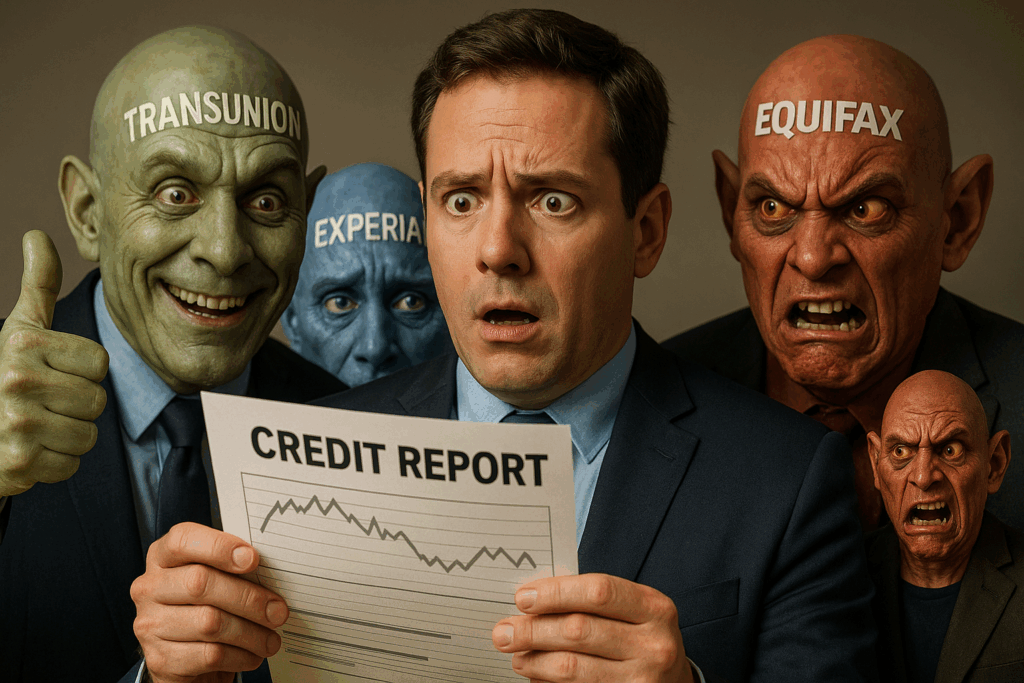Why You Have Three Credit Scores, and Why They’re Different

You pull your credit report, expecting a simple answer, and instead, you see three different scores from three different bureaus. One’s good, one’s okay, and one seems way off. What gives?
The truth is, having three credit scores isn’t a glitch. It’s how the system works. And understanding why those scores are different is a big step toward taking control of your credit.
Let’s break it down.
Who Are the “Big Three” Credit Bureaus?
There are three major credit bureaus in the U.S.:
- Equifax
- Experian
- TransUnion
Each one collects data about your credit habits: loans, credit cards, payment history, collections, and more. But they’re independent companies, and they don’t always receive or report the exact same information.
That means your Equifax report might not match your Experian report, and your TransUnion score might be based on slightly different data altogether.
Why the Scores Are Different
Here are the main reasons your credit scores vary across the three bureaus:
1. Not All Lenders Report to All Bureaus
Some creditors only report to one or two bureaus, not all three. That means an account might show up on Experian, but not on Equifax or TransUnion.
Example:
Your credit card company might send your payment history to Equifax and TransUnion, but skip Experian completely. So your Experian score won’t reflect that on-time payment history.
2. Each Bureau May Update on a Different Schedule
Even if all three bureaus have the same account info, they might update it at different times. So your score could reflect last week’s balance on one report and last month’s on another.
Credit scores are constantly recalculated. Even small timing differences can make a noticeable impact.
3. You Might Have Errors or Omissions on One Report
It’s more common than you think. A creditor might accidentally report a late payment to one bureau but not the others. Or a paid collection might have been removed from Experian but not TransUnion.
That’s why checking all three reports regularly is so important. One incorrect item on one bureau could be hurting you more than you realize.
4. Different Scoring Models Are Used
There’s not just one “credit score.” In fact, there are dozens of scoring models: FICO, VantageScore, and even industry-specific versions for auto loans, credit cards, and mortgages.
Each bureau may calculate your score using a different version of the scoring model, even when using the same data.
So Which Credit Score “Matters” the Most?
It depends on who’s pulling your report.
- Mortgage lenders often pull all three scores and use the middle one.
- Auto lenders may check only one bureau, depending on their preference.
- Credit card companies often use just one score to make a decision.
That’s why it’s smart to keep all three reports clean, balanced, and accurate.
How to Keep All Three Scores Healthy
- Check all three reports regularly.
- Dispute errors with the specific bureau that shows the incorrect info
- Keep balances low on all cards, not just the ones that report to one bureau
- Make on-time payments every month with no exceptions
- Use credit monitoring that tracks all three bureaus (not just one)
Final Thought
Your credit isn’t just one number. It’s a snapshot taken from multiple angles.
Knowing why your scores differ empowers you to spot problems faster, dispute errors confidently, and build a stronger profile across the board.
At CreditNerds.com, we help people clean up their credit reports one bureau at a time. Whether your score is off because of an error, outdated info, or something that shouldn’t even be there. We only get paid when we get results. Schedule your free consultation today.

